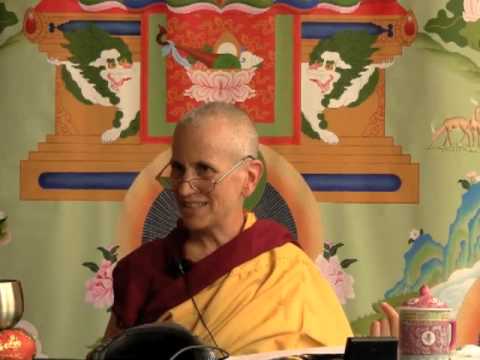Hindrances to concentration: Desire and ill will
Stages of the Path #122: The Fourth Noble Truth
Part of a series of Bodhisattva's Breakfast Corner talks on the Stages of the Path (or Lamrim) as described in the Guru Puja text by Panchen Lama I Lobsang Chokyi Gyaltsen.
- One of our biggest hooks is sensual desire
- How sensual desire and malice/ill will are related
- Antidotes to these hindrances
We’ve been talking about the five hindrances that have to be overcome to generate concentration and serenity. The first one—I mentioned all five of them last time—the first one is sensual desire. This is one of our big hooks. “I want to see nice things. I don’t want to see ugly things. I want to hear nice sounds, nice music, voices that tell me how wonderful I am. I don’t want to hear criticism, I don’t want to hear people telling me they don’t like me, they don’t agree with my ideas. I just want to hear people say how wonderful, and charming, and fantastic I am, and how they’re going to be totally delighted to do whatever I want them to do.” Right? [laughter] We want this, yes? We want to smell nice smells. We don’t want to smell the septic system. We want to smell rhubarb pie or chocolate cake, or something like that. We want to have nice tastes, certain kinds of food we really want. And we want to have nice sensual, touching experiences: the room’s the right temperature, and we want people to hug us, and the bed’s just the right degree of hardness or softness and the right amount of covers so we’re not too cold, we’re not too hot. The covers have to be a certain design. “The blanket’s the one that’s been in my family for the last twenty years, I can’t give it away…” You know? All these external things.
We get so hooked on sensual desire, and we spend a great deal of time thinking about it outside of meditation, and so when we sit down in our meditation, what do we think about? The same things.
Some of us get really caught up in the daydream of, “i’m going to have this, and I’m going to have that, and I want this, and I want that…..” And some of us then go from the one of sensual desire to the second one, which is ill will and malice. The sensual desire is “I’m wanting, and longing, and daydreaming in getting this.” And the ill will and malice is, “Beep beep beep, these people aren’t giving it to me, and they’re getting in my way, and they’re saying mean things to me, and they aren’t doing what I want, and they don’t respect me, and they don’t pay attention to me, and I’m getting ignored, and I just want to give them some of their own medicine, but really it’s for their own benefit. And I can’t stand this situation anymore….” And we get really sunk in with ill will and malice.
Those two are really big distractions in our meditation, aren’t they? You sit down and you get maybe one breath done and then the mind is either daydreaming about what it wants or raging about what it isn’t getting. This is why these two are called hindrances to concentration.
We’ve got to apply the antidotes. To the things that we’re attached to, to remember they’re impermanence, to remember they’re unsatisfactory by nature, that even if we get them they aren’t going to do everything for us. And when we’re stuck in thoughts of ill will and malice, to cultivate love and compassion for ourselves and also for the other person. But to switch the mind and really try and think that that person’s just like us, they want happiness, they don’t want to suffer. It’s not like they’re trying to make our lives miserable. They’re just doing their best to be happy and it doesn’t meet our agenda for them. But it’s not that they’re evil people. So to extend some friendliness towards them, some understanding, some wish for them to be happy, some wish for ourselves to be happy, instead of being so hard on ourselves: “I’m so awful, always have so much ill will and malice, I’m hopeless, no wonder I can’t concentrate…” You know, using the Dharma to beat ourselves up with. Or beat ourselves up: “Oh I’m always wandering with these objects of attachment, I can’t meditate, I’m hopeless….” All that kind of stuff is just more and more rubbish, so it’s better just to drop it. Instead, think about impermanence and unsatisfactory nature to counteract the sensual desire; think of fortitude and love and compassion and forgiveness—for yourself and others—to overcome the ill will and malice.
[in response to audience] Okay, so if meditating regularly on impermanence will undermine the mind that tends to move towards sensual desire? Of course. Because the more you have a repeated habit in seeing things as transient, the less your mind is going to want to grab onto them. Similarly the more you meditate about the disadvantages of cyclic existence and the unsatisfactory nature of cyclic existence, the less you’re going to be seeking your happiness in cyclic existence. So when I say “antidotes” to it, it doesn’t mean you let that thing arise and then apply the antidote. I mean, it can mean that. But it’s better—prevention is the best medicine—so you do those meditations regularly then your mind doesn’t tend to go to those extremes. In the same way if you make it a habit to meditate on fortitude and love and compassion and forgiveness, then your mind is already thinking in that direction, and anger—either for yourself or for other people—is going to naturally not be as strong, and won’t arise as much.
Venerable Thubten Chodron
Venerable Chodron emphasizes the practical application of Buddha’s teachings in our daily lives and is especially skilled at explaining them in ways easily understood and practiced by Westerners. She is well known for her warm, humorous, and lucid teachings. She was ordained as a Buddhist nun in 1977 by Kyabje Ling Rinpoche in Dharamsala, India, and in 1986 she received bhikshuni (full) ordination in Taiwan. Read her full bio.


